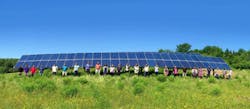City of North Chicago opening door to Community Solar through partnership with Solstice
Solstice Power Technologies will work with the city of North Chicago to bring community solar access to its residents soon.
Community solar are relatively small projects which offer an option between utility-scale farms and rooftop solar. The utility projects can involve rate cases which cost the customer regardless of whether they actually benefit from the solar energy generated, and rooftop, residential solar is often cost-prohibitive, especially for lower income households.
The new deal with North Chicago is one of 11 municipal partnerships that Solstice has developed in Illinois. Customers who sign up for the community solar subscription will receive a $50 enrollment bonus.
"Our goal is to make clean energy accessible to everyone and having the 'seal of approval' from local leaders like Mayor Rockingham means that we can overcome the major obstacle that looms over many community solar programs - the myth that these programs are too good to be true, or that there will be a hidden fee or credit check to enroll,” Solstice CEO and co-founder Steph Speirs said. “Through the statewide program Illinois Solar for All and our partnership with the City of North Chicago, we can assure residents that Solstice is committed to improving their livelihoods and bringing clean energy savings closer to home."
Related stories: Scale Microgrid acquiring over 100 MW of NY Community Solar
Rising Tide of Community Solar: Perspective with OYA Renewables Founder
Residents in North Chicago who rent or own their homes are situated within a qualified geographic zone and are likely to meet the eligibility criteria to participate in the Illinois Solar for All Community Solar program through Solstice, who is an approved vendor. Subscribers of this statewide program can get up to 50 percent savings on the supply portion of their electric bill, making affordable renewable energy truly accessible.
To receive the discount customers must qualify to join the Illinois Solar for All program which is designed for income-eligible residents who earn 80% or less of the Area Median Income (AMI).
